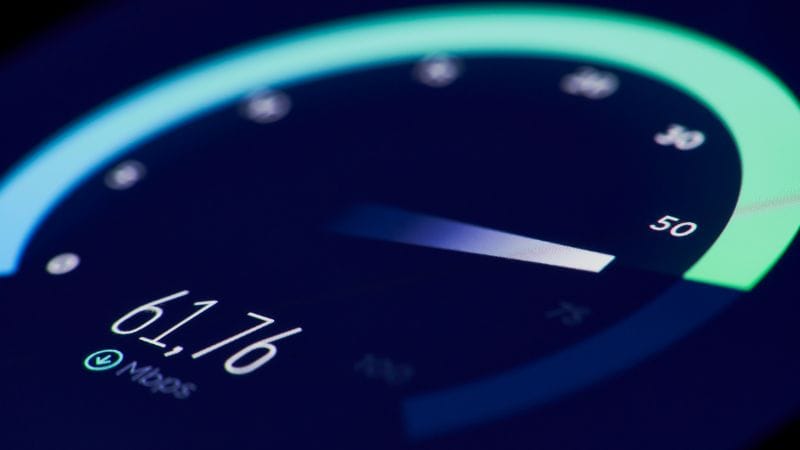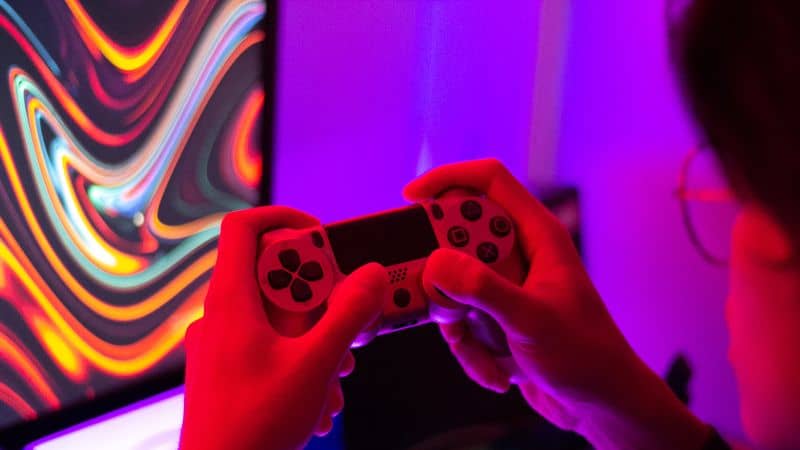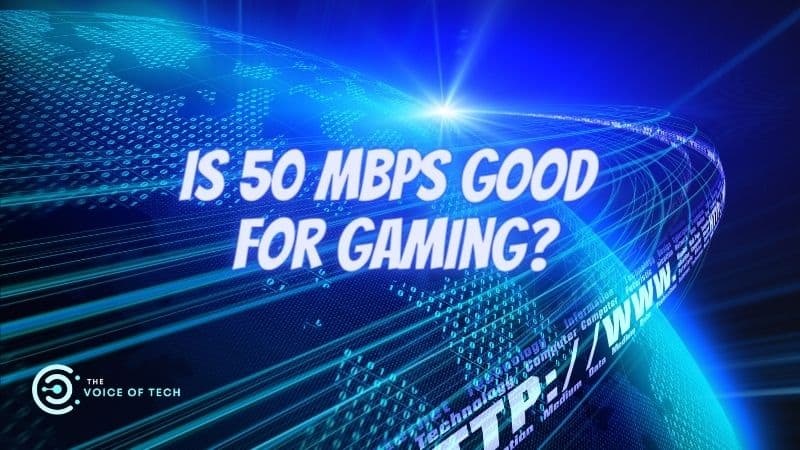
Expert Consulted: Adrian Gardiner. Years of experience building and maintaining customer PCs, in particular for gaming, have allowed me to build a wealth of expertise in this field. In this article, I’ll be sharing my knowledge with you to answer the question: Is 50 Mbps good for gaming?
A fast internet connection is vital in online gaming, and many wonder if 50 Mbps is enough.
While individual needs differ, understanding the Internet speed’s effect on gaming is key.
Mbps measures data transmission speed, but latency, packet loss, and stability also affect gaming quality. Recommended speeds for gaming will also vary, especially with multiplayer games. Higher speeds reduce lag and improve responsiveness.
So, to answer the question: Is 50 Mbps good for gaming?
50 Mbps is generally suitable for most gaming needs, especially for casual or single-player games. However, higher speeds with low latency would be preferable for optimal multiplayer gaming and simultaneous streaming or downloading. Factors like game type, number of devices, and other internet activities can also influence performance.
In the rest of this article, I explore these factors and how they can help you make the most of your Internet connection and decide whether yours is fast enough.
Is 50 Mbps Good for Gaming? A Deep Dive Into the Details
When it comes to gaming, having a reliable and fast internet connection is essential. So, is 50 Mbps good for gaming? Let’s take a closer look:
- With a download speed of 50 Mbps, you can enjoy a smooth gaming experience. This speed allows for quick downloads, minimal lag, and usually seamless online gameplay.
- If you enjoy playing multiplayer games, a connection speed of 50 Mbps is more than sufficient. It provides a stable connection, reducing the chances of experiencing latency or disconnections during intense gaming sessions.
- With 50 Mbps, you can easily stream your gameplay on platforms like Twitch or YouTube without any interruptions. This speed ensures high-quality streaming and a smooth viewing experience for your audience.
- Suppose you have multiple devices connected to your network while gaming; a connection speed of 50 Mbps can support them without major issues. Prioritizing your gaming device is important to ensure the best gaming performance.
- With a speed of 50 Mbps, you can quickly download game updates and new releases, allowing you to jump right into your gaming sessions without much delay.
So, 50 Mbps is considered good for gaming, providing a fast and reliable connection that is suitable for multiplayer gaming, streaming, and downloading games.
What is Mbps?
Mbps measures internet speed, indicating how fast data transmits over a network. In gaming, a higher Mbps download speed offers smoother gameplay.
One megabit equals one million bits, so more Mbps means a faster connection. In gaming, it affects data transfer between the game server and player, influencing latency and responsiveness.
For gaming, especially online multiplayer, an internet plan providing a download speed above 50 Mbps is recommended, though needs vary based on game type and connected devices.
What Internet-Related Factors Affect Gaming Performance?

A number of factors can affect gaming performance, and it’s essential to consider them when evaluating internet speed for gaming. These factors include:
- Latency: Latency refers to the time it takes for data to travel from your device to the game server and back (like a key press on your keyboard or a mouse movement). Lower latency is crucial for a smooth gaming experience, as high latency can result in lag and delays in gameplay.
- Bandwidth: Bandwidth determines how much data can be transmitted over the internet connection. Higher bandwidth allows for faster and more consistent data transfers. Insufficient bandwidth can lead to slow downloads, buffering, and degraded gaming performance.
- Download Speed: Faster speeds, ideally at least 25 Mbps, ensure quick game downloads and updates. The faster, the better.
- Upload Speed: Crucial for multiplayer games; aim for at least 5 Mbps to transmit actions swiftly.
- Network Congestion: Network congestion occurs when there is high traffic on the internet network, leading to slower speeds and increased latency. Gaming during peak times or in areas with heavy internet usage can be negatively impacted by network congestion.
- Packet Loss: Packet loss refers to the failure of data packets to reach their destination. Even a small percentage of packet loss can cause disruptions in gameplay and result in laggy or stuttering gameplay.
- Wired Connection: Ethernet connections offer more stability and lower latency than over Wi-Fi.
- Hardware and Software: The quality and performance of your gaming device, such as your computer or console, can also affect gaming performance. Outdated network hardware or improperly configured settings can lead to connectivity issues and poor performance.
Is 50 Mbps Sufficient for Gaming?
Is 50 Mbps good for gaming? In my experience, yes. Depending on what else you’re doing on your PC (i.e., streaming, heavy downloading, etc.), online gaming will usually be absolutely fine with a 50 Mbps download speed for one or more players.
Personal Experience
I live in a household with two active adult gamers and have had no problems at all with our 55 Mbps fiber internet broadband service; speeds and latency have mostly never been an issue (occasionally, a large download by one person has caused an issue, but this doesn’t happen often).
This is also coupled with both my wife and I working from home and using our own computers all the time.
Our situation may eventually change as technology continues to evolve, both as a delivery service from an ISP and as hardware in the form of a broadband router and computer equipment.
Areas local to me are now receiving upgrades in the form of a fiber-to-the-home (FTTP) connection with download speeds in excess of 500 Mbps, so changes are always on the horizon.
Check Your Broadband Service
If you do have issues with your broadband service, you may either have a technical fault that needs looking into, or you may need to consider upgrading your broadband service to get more speed and avoid a laggy gaming experience. Always check the reviews for an ISP to see how well they’re viewed by other users.
Gameplay can also be affected by network congestion, server distance, and the number of connected devices. Different games can also have unique bandwidth needs.
To enhance gaming, optimize network settings, prioritize gaming traffic, use a fixed wired connection, or upgrade to a faster broadband service.
After experiencing online gameplay issues, I’ve had clients upgrade from less than 10 Mbps to well over 50 Mbps (often by switching ISP), and significantly improving their gaming experience by reducing lag and latency.
Other Internet Activities Affecting Download Speed
For gaming on a 50 Mbps connection, consider concurrent internet activities. Streaming, especially in HD or 4K, consumes significant bandwidth, potentially affecting gaming performance.
Large downloads, especially game updates (which can be huge), can slow gaming.
Multiple devices on the network also divide bandwidth, possibly causing lag. To optimize gaming, limit downloads, avoid background streaming, and consider a direct Ethernet connection.
While 50 Mbps can support gaming, managing other activities will further help to ensure a smoother experience.
How to Improve Your Gaming Experience with 50 Mbps

Looking to enhance your gaming experience with a blazing internet connection? In this section, we’ll dive into a range of potential improvements that you can implement to improve your gaming experience with a 50 Mbps download connection.
Discover how to reduce network congestion, optimize your network settings, and even upgrade your networking hardware. Get ready to level up your gaming prowess and leave lagging and buffering in the dust!
Reduce Network Congestion
For optimal gaming on a 50 Mbps connection, reducing network congestion is crucial. Here’s how you can improve your connection:
- Limit connected devices: Disconnect unnecessary devices to free up bandwidth.
- Close background apps and downloads: They can significantly consume bandwidth.
- Use Ethernet: It’s more stable than Wi-Fi, reducing latency and interference.
- Upgrade your router: A quality router with Quality of Service (QoS) can prioritize gaming traffic.
- Game during off-peak hours: Avoid times when many users are online to reduce lag.
These steps can enhance your gaming experience by minimizing congestion.
Optimize Network Settings
For better gaming on a 50 Mbps connection, here are a few things you can try:
| 1. | Prioritize gaming traffic in router settings – this will depend on the broadband router you have, as not all will allow you to change these settings. |
| 2. | Close background apps and pause downloads to free bandwidth – this is an easy fix. |
| 3. | Update your router’s firmware regularly – not so easy to do for the average user, but if you can, it’s definitely worth doing. |
| 4. | Use low-latency DNS settings like Cloudflare DNS, Google Public DNS, or OpenDNS. |
| 5. | Adjust firewall settings to open game-specific ports. |
| 6. | Use a virtual private network (VPN) for closer server connections, reducing latency – this may be an option, but it will depend heavily on the quality of your VPN service. |
| 7. | Monitor network usage using software or built-in router tools to detect excessive bandwidth usage or unusual network activity that may impact gaming performance. |
These adjustments can all help improve your gaming experience.
Upgrade Networking Hardware
To improve your gaming on a 50 Mbps connection:
- Router Upgrade: Upgrade to a high-quality router with features like Quality of Service (QoS) for better performance, especially if your router is more than a few years old. Broadband providers are always bringing out new, improved routers but don’t always let existing clients know of this.
- Fixed Ethernet: Use an Ethernet cable for a stable connection, avoiding Wi-Fi – in my experience, a fixed Ethernet cable connection will always be better for gaming.
- Connectivity Issues: If you face connectivity issues, you may need to upgrade your router to one compatible with higher speeds. Technology is moving all the time, so your existing router may be outdated – check with your Internet service provider (ISP).
- Wi-Fi Boost: Boost the Wi-Fi signal by repositioning the router, using extenders or mesh systems, or investing in a new router with a better Wi-Fi range.
- Move to a Better ISP: Consider moving to a better quality Internet service provider – the level of service varies tremendously from provider to provider. Check the reviews to see which ISP is coming out on top.
Either of these upgrade options should result in an improved gaming experience.
With the right equipment, you can reduce lag, improve connectivity, and enjoy a more reliable and smoother online gaming experience. Keep in mind that the specific hardware you need may vary depending on your setup and requirements.
Conclusion
A download speed of 50 Mbps coupled with an upload speed of around 5 Mbps would be great for gaming. If you have issues with these speeds, I’ve outlined above a range of options you can take to improve your service and, ultimately, your gaming experience.
You may see the occasional hiccup in a household with other internet users who are also gaming or streaming, downloading or just watching videos, etc. If this becomes a regular issue, then the way forward would be to investigate the possibility of a better broadband package.
Broadband speeds are increasing all the time, but so are the requirements for games, so a speed of 50 Mbps, while OK now, may not be adequate in the future. Keep your computers and broadband router up to date and keep an eye on household data usage to avoid or minimize future problems.
Image Attribution and Licensing
Main image: ‘Internet’ by Nadia (Canva Pro)
#1: ‘Checking Internet Speed’ by Golibtolibov (Canva Pro)
#2: ‘Playing video game with controller’ by Jazmin Tabuena (Canva Pro)

